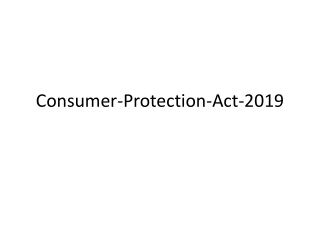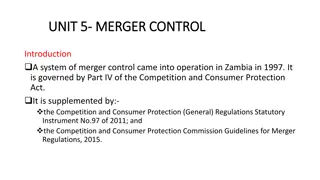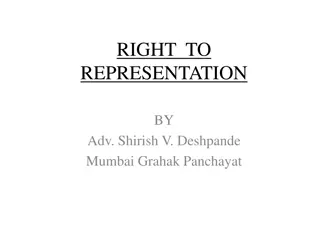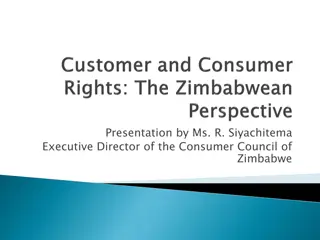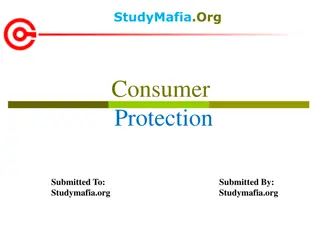Understanding the Consumer Protection Act 2019
The Consumer Protection Act 2019, replacing the 1986 Act, addresses modern consumer challenges in the digital age. It safeguards consumer rights, ensures product/service safety, and aims at effective dispute resolution. Consumers are empowered with rights and protection against unfair trade practices.
- Consumer rights
- Consumer protection
- Digital age commerce
- Indian Parliament
- Effective dispute resolution
Download Presentation

Please find below an Image/Link to download the presentation.
The content on the website is provided AS IS for your information and personal use only. It may not be sold, licensed, or shared on other websites without obtaining consent from the author. Download presentation by click this link. If you encounter any issues during the download, it is possible that the publisher has removed the file from their server.
E N D
Presentation Transcript
SeminarPpt.com Seminar on Consumer Protection Act 2019 Submitted to: Seminarppt.com Submitted By Seminarppt.com
Table Contents Definition Introduction Need for the New Act Details of the Act Rights of the Consumer Provisions of Consumer Rights Conclusion 2
Definition The new Consumer Protection Act was passed by Parliament in 2019. It came into force in July 2020 and replaced the Consumer Protection Act, 1986. 3
Need For the New Act The Digital Age has ushered in a new era of commerce and digital branding, as well as a new set of customer expectations. Digitisation has provided easy access, a large variety of choices, convenient payment mechanisms, improved services and shopping as per convenience. However, there are also associated challenges related to consumer protection. 5
Need For the New Act To help address the new set of challenges faced by consumers in the digital age, the Indian Parliament passed the landmark Consumer Protection Bill, 2019 which aims to provide timely and effective administration and settlement of consumer disputes. 6
Details of the Act Consumer Protection Act, 2019 is a law to protect the interests of the consumers. This Act provides safety to consumers regarding defective products, dissatisfactory services, and unfair trade practices. 7
Details of the Act The basic aim of the Consumer Protection Act, 2019 is to save the rights of the consumers by establishing authorities for timely and effective administration and settlement of consumers disputes. 9
Rights of the Consumer Consumers have the right to information on various aspects of goods and services. This could be information about the quantity, quality, purity, potency, price, and standard of goods or services. To be protected from unfair or restrictive trade practices. 10
Rights of the Consumer To be protected from hazardous goods and services. Right to protection against goods and services that can be dangerous to life and property. Consumers have the right to access a variety of goods and services at competitive prices. Consumers should have the right to redressal. 11
Provisions of Consumer Act As per the Act, a person is called a consumer who avails the services and buys any good for self-use. Worth to mention that if a person buys any good or avails any service for resale or commercial purposes, he/she is not considered a consumer. This definition covers all types of transactions i.e. offline and online through teleshopping, direct selling or multi-level marketing. 12
Provisions of Consumer Act The Act proposes the establishment of the Central Consumer Protection Authority (CCPA) as a regulatory authority. The CCPA will protect, promote and enforce the rights of consumers and regulate cases related to unfair trade practices, misleading advertisements, and violation of consumer rights. 13
Provisions of Consumer Act CCPA would be given wide-ranging powers. The CCPA will have the right to take suo-moto actions, recall products, order reimbursement of the price of goods/services, cancel licenses, impose penalties and file class-action suits. The CCPA will have an investigation wing to conduct independent inquiry or investigation into consumer law violations. 14
Provisions of Consumer Act The Act has the provision of the establishment of Consumer Disputes Redressal Commissions (CDRCs) at the national, state and district levels to entertain consumer complaints. 15
Provisions of Consumer Act As per the notified rules, the State Commissions will furnish information to the Central Government on a quarterly basis on vacancies, disposal, the pendency of cases and other matters. 16
Provisions of Consumer Act The CDRCs will entertain complaints related to: Overcharging or deceptive charging Unfair or restrictive trade practices Sale of hazardous goods and services which may be hazardous to life. Sale of defective goods or services 17
Conclusion In order to protect the consumers from exploitation and to save them from adulterated and substandard goods and deficient services, the Consumer Protection Act came into force on 15th April 1986. It was replaced by the Consumer Protection Act 2019. 19
References Wikipedia.org Google.com Seminarppt.com Studymafia.org


